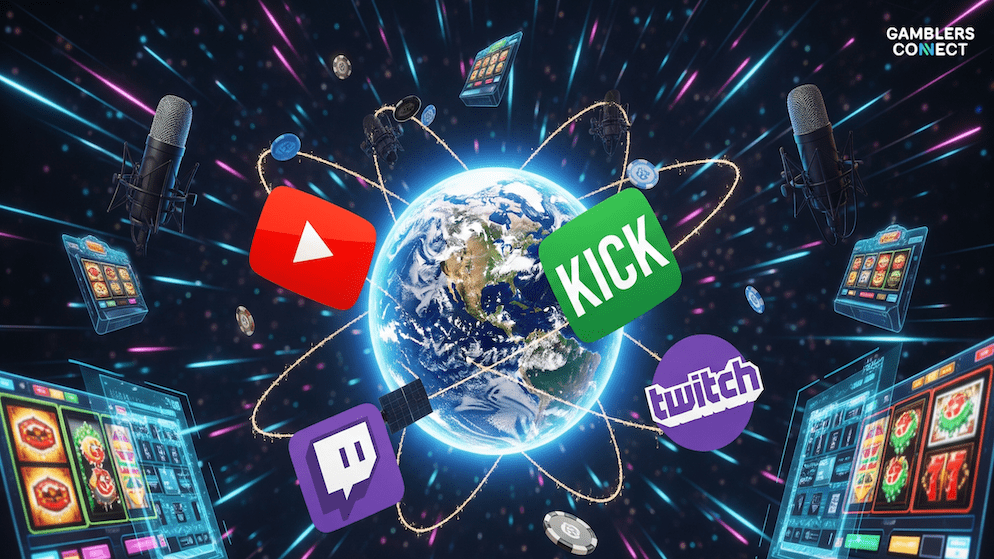
The Ultimate Guide to Gambling Streamers
Welcome to the electrifying, high-stakes, and deeply controversial world of the gambling streamers. In just a few short years, this explosive niche has reshaped the landscape of online entertainment, turning charismatic personalities into multi-millionaires and elevating platforms like Kick to challenge industry giants.
These modern-day digital gladiators broadcast themselves wagering fortunes on online slots, blackjack, and high-stakes sports bets, captivating millions of viewers worldwide.
This guide will serve as your ultimate resource, breaking down every facet of this world: the platforms that host them, the opaque business models that fund them, the key players from titans of industry to agents of chaos, and the serious ethical questions that loom over their future.
The Platforms: A Tale of Two Titans
The current landscape is defined by a power struggle between the platform that created the genre and the one that perfected its most lucrative form.
Twitch
For years, Twitch was the undisputed cradle of gambling streaming. It allowed the niche to grow organically, fostering the rise of its first generation of stars. However, as the deals grew larger and the on-screen stakes became more astronomical, a wave of criticism from the community and media forced the platform’s hand. In a pivotal move in October 2022, Twitch enacted a ban on the streaming of unlicensed gambling sites, specifically targeting the crypto casinos like Stake.com and Rollbit.com that had become the financial backbone of the entire ecosystem. This decision, while praised for its ethical stance, created a massive power vacuum and triggered an exodus of its top talent.
Kick
Emerging directly from the ashes of Twitch’s ban, Kick.com launched in late 2022 as a purpose-built haven for gambling content. With backing from figures tied to Stake.com and co-founder/advisor Trainwreckstv, Kick rolled out the green carpet for displaced streamers. It aggressively courted them with multi-million dollar contracts, near-total freedom over their content, and a revolutionary 95/5 revenue split that made Twitch’s model look archaic. This strategy was a resounding success, with nearly all major gambling streamers, from Roshtein to Adin Ross, making Kick their exclusive home. Kick is now the undisputed global hub for high-stakes casino streaming and is leveraging this dominance to expand, even attracting mainstream giants like MrBeast to legitimize its brand beyond the gambling world.
YouTube
YouTube holds a unique and vital position. It is the primary home for a popular sub-genre of land-based casino streamers who film their sessions in real, physical casinos and upload polished, edited videos. Stars like Vegas Matt and Lady Luck HQ thrive here, as the platform’s algorithm favors the high-drama, visually engaging format of a “record-breaking jackpot” video. It also serves as a crucial VOD (Video on Demand) archive for Kick streamers, where their most spectacular wins and catastrophic losses are clipped and repackaged, reaching an even wider audience.
The Business Model: A Lucrative Enigma
The finances behind gambling streaming are staggering, with top creators boasting net worths rivaling traditional celebrities. The methods for achieving this wealth are varied and often opaque.
- The Sponsorship Model (The Kick Paradigm): This is the engine of the Kick ecosystem. Casinos pay elite streamers eight-figure deals to exclusively play on their sites. It’s more than just a sponsorship; it’s a content partnership where the casino often provides a non-withdrawable “house money” balance for the streamer to use. This removes all personal financial risk, allowing for the impossibly high bets that attract viewers, but it also forms the core of the genre’s “fake money” controversy. The multi-million dollar net worths of Roshtein and Trainwreckstv are direct results of this model.
- The Affiliate Model (The Grind): For the vast majority of smaller to mid-sized gambling streamers, affiliate marketing is the primary goal. They use unique links or codes to drive their viewer traffic to online casinos. They are then compensated based on one of two models: CPA (Cost Per Acquisition), a flat fee for each new player who signs up and deposits, or RevShare (Revenue Share), a long-term percentage of the net losses generated by the players they refer. This creates a direct financial incentive for their audience to gamble and lose.
- The Land-Based Model (The YouTube Approach): This model is perceived as far more transparent. YouTubers like Mr. Hand Pay and Vegas Matt are filmed physically inserting their own cash into slot machines. Their business relies more on YouTube ad revenue, brand sponsorships (unrelated to the casinos themselves), merchandise sales, and community-based income like Patreon. While still playing at high stakes, the “skin in the game” is visibly their own, creating a more authentic, albeit still risky, viewing experience.
The Streamers: Kings of a New Kingdom
The gambling streaming world is a constellation of diverse and powerful personalities, each with a unique brand and a massive following.
The MrBeast Effect: Kick’s Play for the Mainstream
A pivotal moment in Kick’s journey to challenge industry giants occurred in early 2024 when MrBeast (Jimmy Donaldson), arguably the biggest content creator on the planet, made his debut on the platform. While he didn’t sign an exclusive contract, he uploaded his first video to the site, generating massive buzz and signaling a potential shift in the creator landscape.
The significance of this move cannot be overstated. For Kick, having the world’s most recognizable YouTuber on their platform was an immense public relations victory. It instantly brought a new level of credibility and mainstream attention, demonstrating that their ambitions extended far beyond being just a haven for gambling streamers. The experiment was also a financial success for MrBeast, who revealed he earned a substantial amount from that single video, showcasing the raw power of Kick’s 95/5 creator revenue split.
This act served as a powerful proof-of-concept for other mainstream, non-gambling creators, proving that Kick was a financially viable and potentially lucrative alternative to Twitch and YouTube. MrBeast’s appearance was a strategic masterstroke by Kick, aiming to diversify its content and sanitize its brand to attract a wider audience and more significant advertisers.
The Titans of Kick (Online Casino Streamers)
- Roshtein (Ismael Swartz): The undisputed “King of Slots” and a pioneer of the genre. An enigmatic figure from Sweden, Roshtein built a massive following on Twitch with his unparalleled energy, extremely high bets, and a fiercely loyal community. His brand is built on positivity and the collective chase for massive wins. With an estimated net worth exceeding $100 million, his move to Kick was a seismic event that solidified the platform’s legitimacy.
- Trainwreckstv (Tyler Niknam): An American streamer and a co-founder of Kick, Trainwreckstv is one of the most influential and outspoken figures in the space. He began as a variety streamer before pivoting to high-stakes slots, becoming famous for his raw, unfiltered rants and mind-boggling “bonus buy” sessions. With a net worth around $25 million, he is both a top-tier creator and a powerful industry player.
- Adin Ross: A controversial titan of streaming, Adin Ross has leveraged his massive youth following into a streaming empire on Kick. He blends high-stakes gambling with celebrity interviews, viral stunts, and large-scale events. While his content is wildly popular, he is a lightning rod for criticism regarding his influence on his young audience and the normalization of high-risk behavior.
- CasinoDaddy: This unique channel features a trio of Swedish brothers: Masse, Ebro, and Ante. Streaming since 2016, they built their brand on a foundation of genuine passion for slots, brotherly banter, and marathon broadcasts. Their team dynamic provides a different flavor of content, and their longevity has made them respected veterans in the community.
- Xposed (Cody Burnett): A Canadian streamer known for his explosive, high-energy personality. Xposed began his career in the Call of Duty scene before finding massive success in casino streaming. He is known for his transparency about the emotional highs and lows of gambling, and his sessions are often a rollercoaster of jubilant wins and crushing losses.
The YouTube Stars of Vegas (Land-Based Casino Players)
- Vegas Matt (Matt Vaughan): A former tech entrepreneur, Vegas Matt has become a YouTube sensation by filming his high-limit slot adventures in Las Vegas. His brand is built on positivity, entertainment, and memorable catchphrases like, “It’s all about the back-up spin!” He focuses on the fun and experience of playing, creating a more approachable and less intense viewing experience.
- Lady Luck HQ (Francine & Miran Maric): This husband-and-wife duo are the undisputed royalty of YouTube slot content. They travel the United States, documenting their casino sessions in slick, well-edited videos. They are famous for hitting numerous record-breaking jackpots and have built a massive, loyal following through their consistent and high-quality content.
- Mr. Hand Pay (Daniel Tambunga): Known for his focus on achieving “hand pays” (jackpots over $1,200 that must be paid by an attendant), Mr. Hand Pay has carved out a successful niche on YouTube. His videos are straightforward and focus on the gameplay, appealing to viewers who are genuinely interested in the mechanics and potential of different slot machines.
The Agents of Chaos & Mainstream Crossovers
- Mellstroy (Andrey Burim): A deeply notorious Belarusian streamer, Mellstroy represents the darkest, most unregulated side of the industry. He is infamous for his shocking on-stream antics, which have included violent assaults and degrading stunts, often encouraged by “bounties” from his casino sponsors. His content is a stark example of the ethical abyss that exists in the genre’s fringes.
- xQc (Félix Lengyel): As one of the world’s most popular streamers, xQc’s journey with gambling has been a major public spectacle. His high-stakes sponsored streams, coupled with his open admissions of a potential gambling addiction, brought unprecedented mainstream scrutiny to the ethics of gambling promotion and streamer responsibility.
- N3on (Rangesh Mutama): A young streamer known for his chaotic “IRL” (In Real Life) content, N3on often features gambling as part of his high-energy, controversy-courting brand. His appeal to a very young demographic makes his promotion of gambling particularly concerning to critics.
The Appeal: A Vicarious Rush
The magnetic pull of gambling streams can be attributed to several powerful psychological factors:
- Vicarious Thrills: Viewers can experience the heart-pounding rush of betting life-altering sums of money from the safety of their own screen, without any personal financial risk.
- Entertainment & Personality: The streamer is the main product. The casino game is just the backdrop for their show. Viewers tune in for their humor, their reactions, and their persona.
- Community: The live chat, shared slang (like Roshtein’s “gems”), and community Discord servers create a powerful sense of belonging. Viewers feel like they are part of a team, cheering on their favorite creator.
- The Dream of the Big Win: Watching someone hit a multi-million dollar jackpot is a potent fantasy. It makes the impossible seem attainable and feeds into the aspirational nature of lottery-style thinking.
Controversies & Criticisms: The Dark Side of the Spin
The genre is fraught with serious ethical issues that cast a long shadow over its success.
- Transparency & “Fake Money”: The number one criticism is the use of “house money.” By playing with funds provided by sponsors, gambling streamers are insulated from risk, creating a completely artificial and dangerously misleading depiction of gambling. This starkly contrasts with land-based YouTubers, whose use of personal funds is visibly documented.
- Glamorizing Addiction: The content often showcases behaviors symptomatic of problem gambling—chasing losses, escalating bets, and playing for dangerously long sessions. xQc’s public struggles served as a real-time case study of how this can manifest, blurring the lines between entertainment and a genuine cry for help.
- Targeting Vulnerable Audiences: The primary demographic for Kick and Twitch is teenagers and young adults. The flashy, high-energy presentation of gambling, promoted by influential figures like Adin Ross and N3on, is seen by critics as a predatory pipeline designed to introduce a new generation to a potentially devastating hobby.
- Lack of Regulation & Extreme Content: The space operates in a “Wild West” environment. The shocking and often illegal behavior of streamers like Mellstroy, who was sponsored by casinos during his most infamous stunts, highlights a profound lack of oversight and platform accountability. It raises serious questions about where the line between entertainment and criminal behavior lies.
Conclusion: The Final Spin
The world of gambling streamers is a dazzling, chaotic, and morally complex frontier of modern entertainment. It is a space of incredible financial opportunity, where charismatic personalities can build multi-million dollar empires on the back of vicarious thrills and a dedicated community. The rise of Kick has fundamentally reshaped the creator economy, proving that a streamer-first financial model can successfully challenge an industry titan like Twitch. From the transparent, family-friendly adventures of YouTubers in Las Vegas to the opaque, high-octane sessions of the Kick elite, the genre is vast and varied.
However, this lucrative world is built on a foundation of serious ethical questions. The persistent lack of transparency around “house money,” the glamorization of addictive behaviors, and the exposure of gambling content to young, impressionable audiences are critical issues that the industry has yet to resolve. The shocking antics of figures on the genre’s fringes serve as a stark reminder of the risks in an under-regulated environment.
Looking forward, the future of gambling streaming is at a crossroads. Increased regulatory scrutiny from governments seems not just possible, but inevitable. This could force platforms to mandate clearer sponsorship disclosures and implement stricter age verification. The central battle will be whether Kick can maintain its explosive growth while navigating these ethical minefields to attract mainstream advertisers.
The world of the gambling streamers is more than just a passing trend; it’s a high-stakes battle for the future of online entertainment, where fortunes are won, lost, and created in the public eye. Its ultimate legacy will be determined by the ongoing struggle between lucrative content and ethical responsibility.





